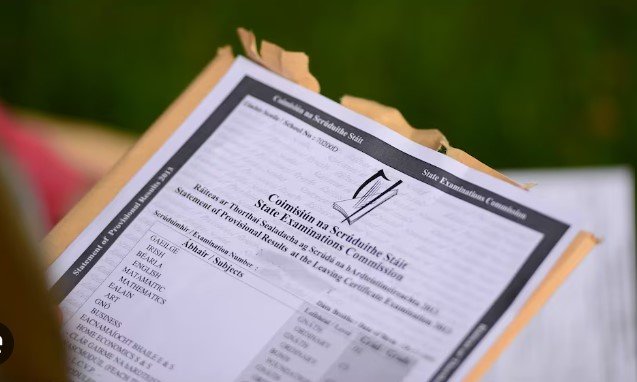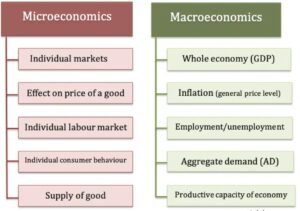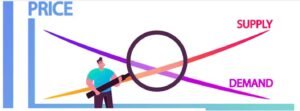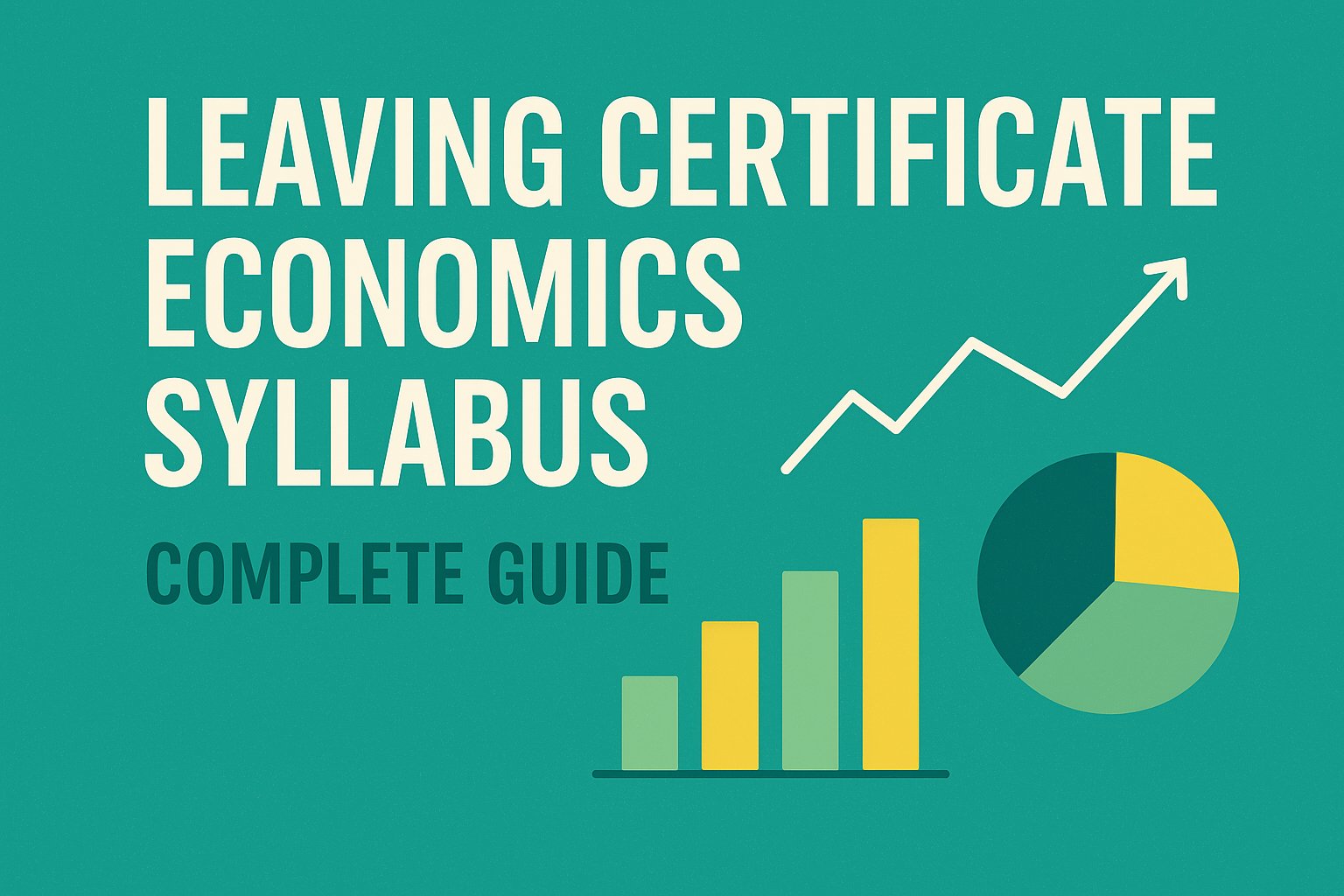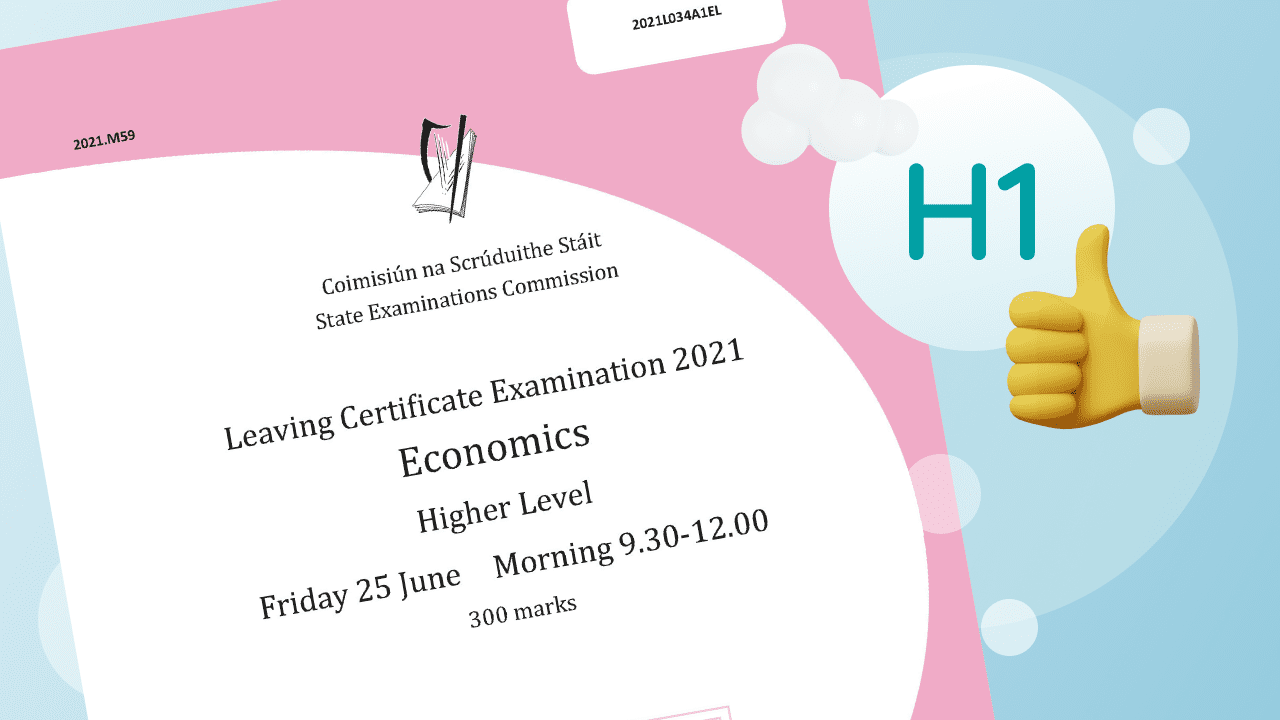The Economics Leaving Certificate exam is a significant milestone in any Irish student’s academic journey. It marks the culmination of secondary education in a subject that bridges the gap between social science theory and real-world business, finance, and policymaking. Achieving a high grade boosts your CAO points and provides a strong foundation for further study and careers in fields like economics, business, politics, and beyond.
In today’s rapidly changing economic landscape, a solid understanding of economic principles can give you a distinct edge—not just on exam day, but throughout your future academic and professional pursuits. This comprehensive guide will explore how to:
- Master Key Topics in the Economics Leaving Certificate syllabus. (You can download the formulae sheet from here)
- Adopt Effective Study Techniques to maximize revision.
- Improve Exam Skills through structured practice and real-world application.
- Leverage Grinds & Tuition for targeted support, including a spotlight on EconomicsGrind.ie.
By the end, you’ll have a clear roadmap to help you excel in the Economics Leaving Certificate and secure the top marks you’re aiming for.
1. Understanding the Economics Leaving Certificate Syllabus
Before diving into revision methods or tuition options, it’s crucial to familiarize yourself with the Economics Leaving Certificate syllabus. This syllabus typically divides into two main sections:
- Microeconomics: Focuses on individual consumers, firms, and industries.
- Macroeconomics: Examines the economy as a whole, covering national income, inflation, unemployment, and policy-making.
Key Microeconomic Topics
- Supply and Demand: Master how markets reach equilibrium, what causes shifts in supply and demand curves, and the concept of elasticity.
- Market Structures: Understand the characteristics of perfect competition, monopoly, oligopoly, and monopolistic competition.
- Costs, Revenue, and Profit: Learn about average costs, marginal costs, total revenue, and profit-maximization in various market structures.
- Factors of Production: Be able to discuss the roles of land, labor, capital, and enterprise in economic activity.
Key Macroeconomic Topics
- National Income Accounting: Concepts like GDP, GNP, and their significance.
- Government Policy: How fiscal (taxes, government spending) and monetary (interest rates, money supply) policies affect the overall economy.
- International Trade: The importance of exports, imports, balance of payments, and exchange rates for small, open economies like Ireland.
- Economic Indicators: Familiarize yourself with measures like inflation, employment, and consumer confidence, which often appear in exam data questions.
Exam Structure
The Economics Leaving Certificate exam typically contains short questions, data-based questions, and essay-style questions. Understanding how marks are allocated is vital; examiners reward clarity, logical structure, and the application of real-world examples where appropriate. Reviewing past papers is an excellent way to see how these questions are framed and what makes high-scoring answers stand out. (Refer Studyclix)
2. Why the Economics Leaving Certificate Is Valuable for Your Future
A robust performance in the Economics Leaving Certificate does more than boost your overall points; it can open doors to a range of academic and career paths. Irish and international universities highly value applicants with a background in economics, as the subject fosters:
- Analytical Thinking: Dissecting market trends and government policies.
- Quantitative Skills: Interpreting data, understanding economic indicators, and performing calculations.
- Effective Communication: Writing coherent, evidence-based essays on complex topics.
- Critical Problem-Solving: Applying theoretical models to real-world situations.
These transferable skills are highly prized in fields like finance, government, consulting, and research. So, if you’re weighing up whether to invest more effort in Economics or to seek additional tuition, remember that the benefits extend far beyond the exam itself.
3. Mastering Microeconomics for the Economics Leaving Certificate
Microeconomics forms the backbone of your theoretical understanding. Here’s how to tackle key areas:
3.1 Supply and Demand Mastery
- Draw and Label: Be ready to create accurate supply and demand diagrams, labeling axes and equilibrium points properly.
- Shifts vs. Movements: Distinguish between a movement along a curve (due to price changes) and a shift of the curve (due to external factors like income changes or taste shifts).
- Elasticity: Practice calculating and interpreting price elasticity of demand, income elasticity, and cross elasticity. Numerical examples are essential for building confidence.
3.2 Cost & Revenue Analysis
- Cost Structures: Understand fixed vs. variable costs, and average vs. marginal costs.
- Revenue Concepts: Grasp total revenue (TR), average revenue (AR), and marginal revenue (MR).
- Profit Maximization: Integrate your knowledge of costs and revenue to see how firms decide on output levels.
3.3 Market Structures
- Characteristics: Know the differences between perfect competition, monopoly, oligopoly, and monopolistic competition in terms of the number of firms, product differentiation, and market entry barriers.
- Real-World Examples: Citing relevant businesses or sectors can make your exam answers more compelling.
4. Mastering Macroeconomics for the Economics Leaving Certificate
Macroeconomics expands the lens from individual markets to the entire economy. Key areas include:
4.1 Measuring Economic Performance
- GDP, GNP, NNP: Understand the methods of calculation and the limitations of each measure.
- Real vs. Nominal: Know how inflation adjustments affect these figures.
- Significance: Recognize why these indicators matter for policymaking and economic health.
4.2 Inflation, Employment, and Economic Cycles
- Inflation Indices: CPI and other relevant measures for Ireland.
- Causes of Inflation: Demand-pull, cost-push, and imported inflation.
- Unemployment Types: Frictional, structural, cyclical, and how each impacts government policy decisions.
4.3 Government Policy (Fiscal & Monetary)
- Fiscal Policy: How government spending and taxation influence economic growth, inflation, and employment.
- Monetary Policy: Central bank decisions on interest rates and money supply, crucial for controlling inflation and stabilizing currency values.
- Policy Goals: Linking policy actions to objectives like price stability, economic growth, and full employment.
4.4 International Trade
- Comparative Advantage: Why countries specialize and trade.
- Trade Barriers: Tariffs, quotas, and their impacts on domestic and global markets.
- Exchange Rates: How currency fluctuations affect exports, imports, and overall economic health—especially relevant for an open economy like Ireland.
5. Study Techniques to Excel in the Economics Leaving Certificate
Knowing what to study is half the battle; the other half is how you study. Here are proven techniques:
5.1 Structured Timetables
Allocate time slots specifically for micro and macro topics, ensuring you revisit challenging areas often. For instance, spend a few hours one day reviewing elasticity calculations, then switch to a macro policy discussion the next.
5.2 Active Learning Strategies
- Summaries: After reading a chapter, write a concise summary in your own words.
- Formulae Sheets: Especially useful for definitions and formulas.
- Discussion: Explaining a concept to a friend or family member helps reveal gaps in your understanding.
- Teaching: If you can teach someone else, you’ll solidify your own grasp of the topic.
5.3 Past Papers & Marking Schemes
Reviewing Economics Leaving Certificate past exam papers is one of the best ways to familiarize yourself with question styles and mark allocation. Pay close attention to official marking schemes, noting how much weight is given to definitions, diagrams, explanations, and examples.
5.4 Incorporate Real-World Examples
Economics is alive, constantly influenced by political changes, technological innovations, and global events. Keep track of major economic stories in Ireland and abroad. Short notes on current affairs—like changes in ECB interest rates or shifts in Irish exports—can enrich your exam essays and show examiners that you’re engaged with the subject.
6. Leveraging Current Affairs in the Economics Leaving Certificate Exam
Staying updated on economic events not only makes revision more engaging but also strengthens your exam performance. By citing recent Irish or global scenarios, you demonstrate:
- Applied Knowledge: Linking textbook theory to ongoing events.
- Critical Thinking: Evaluating how policies or market changes affect real economies.
- Relevance: Examiners reward answers that go beyond memorized facts to include contemporary analysis.
A simple habit: Spend 5–10 minutes each day scanning reputable news sources for major economic stories. Jot down brief bullet points on how these events might illustrate or challenge specific economic theories.
7. Exam Techniques: Excelling in the Economics Leaving Certificate Paper
Balancing knowledge with exam technique is the key to success.
7.1 Plan Essay Answers
When facing an essay question, invest a few minutes in sketching an outline—introduction, key points, diagrams, and conclusion. This prevents rambling and helps you stay on topic.
7.2 Precision and Clarity
Avoid padding your answers with unnecessary jargon. Instead, opt for clear, concise language. Examiners appreciate well-organized answers that directly address the question, include relevant diagrams, and incorporate brief, real-world references.
7.3 Data Response Questions
If the Economics Leaving Certificate paper includes data-based questions, interpret the information carefully. Note trends, anomalies, and key figures. Then, connect these observations to underlying economic principles, such as inflation or employment rates.
7.4 Time Management
Practice under timed conditions. Past papers can help you gauge how long to spend on each question. Aim to complete a sample exam or two in realistic conditions, so you’re not caught off guard on the big day.
8. Finding the Best Economics Grinds in Ireland
Even the most self-motivated students can benefit from Economics grinds—private or group tuition tailored to the Economics Leaving Certificate syllabus. The advantages include:
- Expert Guidance: Skilled tutors can pinpoint specific weaknesses and offer targeted strategies.
- Structured Revision: Lesson plans that align with the Leaving Cert timetable ensure consistent progress.
- Exam-Focused Approach: Grinds often include mock exams, detailed feedback, and insights into marking schemes.
- Motivation and Accountability: Regular sessions help you stay on track and build confidence over time.
If you’re searching for high-quality Economics grinds in Ireland, consider EconomicsGrind.ie. With experienced tutors who understand the intricacies of the Economics Leaving Certificate exam, you can receive:
- One-on-One or Group Sessions: Personalized support to clarify challenging topics.
- Comprehensive Resources: Structured notes, practice papers, and revision tips.
- Flexible Scheduling: Convenient options for in-person or online lessons, fitting around your other commitments.
- Results-Oriented Support: A focus on both understanding core concepts and mastering exam techniques.
9. Maintaining Balance: Mindset and Well-Being During the Economics Leaving Certificate Prep
The Economics Leaving Certificate is just one aspect of your academic life, but it can feel all-consuming. Here are some final pointers to keep stress at bay and optimize your performance:
9.1 Growth Mindset
Embrace challenges as opportunities to learn. Struggling with elasticity or government policy? Remember that consistent effort, practice, and seeking help early can transform weaknesses into strengths.
9.2 Effective Time Management
Use methods like the Pomodoro Technique (25 minutes studying, 5 minutes break) to maintain focus. Breaking tasks into smaller chunks can make your overall workload more manageable.
9.3 Self-Care Essentials
- Sleep: Aim for 7–8 hours per night to consolidate learning and maintain energy.
- Nutrition: Balanced meals and hydration can significantly impact concentration levels.
- Exercise: Even short walks or brief workouts can reduce stress and boost cognitive function.
9.4 Study Groups vs. Solo Time
Studying with peers can be beneficial for discussing real-world examples or quizzing each other on definitions. However, ensure these sessions stay productive. You’ll also need solitary revision blocks to focus on personal weak spots.
9.5 Seek Help Early
Don’t wait until the last minute if you’re consistently struggling. Talk to your teacher, get tutoring, or explore additional resources like those offered by EconomicsGrind.ie. Timely intervention can save you from panic mode close to exam time.

